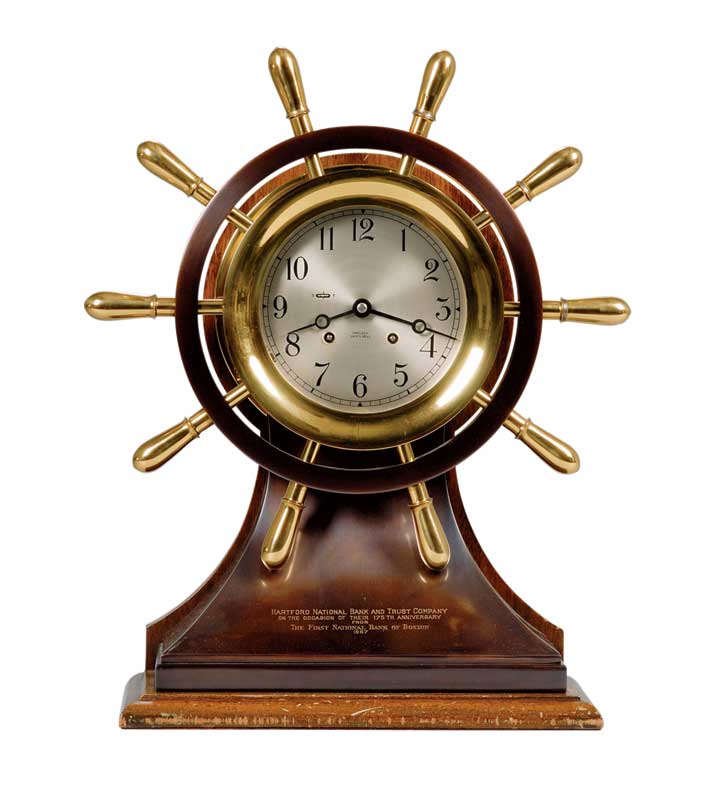Antiques: Chelsea Clocks
To hear my punctual mother tell it, I was born two weeks early and that was the last time I was early for anything. A skillful procrastinator, I seem powerless to change. I hear the tick of the clock and I rage against that machine. But even as I curse the swing of the pendulum, […]

This c. 1967 bronze an brass Chelsea “yacht wheel” clock with ship’s bell striking mechanism stands 17.5 inches high on a mahogany base. It sold for $1,659 at auction in August 2008.
Photo Credit : Inc., SkinnerTo hear my punctual mother tell it, I was born two weeks early and that was the last time I was early for anything. A skillful procrastinator, I seem powerless to change.
I hear the tick of the clock and I rage against that machine. But even as I curse the swing of the pendulum, I know that its constancy, its unrelenting mark of time, keeps me on task and moving forward. I may never beat the clock, or even master its principle, but I have a healthy respect for what it makes a dawdler like me accomplish.
Which brings me to the Chelsea Clock Company. I typically write about objects that are beautiful at first glance. With Chelsea’s clocks, however, the beauty is more on the inside: a beauty of precision, accuracy, quality, and excellence. Founded in 1897 in Chelsea, Massachusetts, this firm is one of the largest and oldest clock manufacturers in the U.S. It was originally named the Eastman Clock Company, after its founder, Joseph Eastman, who had been previously associated with the Harvard and Boston Clock companies.
His innovation was to adapt a watch movement for use in a small striking clock for the home; like the ships’ chronometers on which it was modeled, it could keep time in any position, a big improvement over the pendulum clocks of the day. Despite Eastman’s genius, the company went bankrupt, but eventually found success after it was purchased by Boston native Charles Pearson. He renamed it the Chelsea Clock Company.
Pearson’s business acumen spawned the company’s most enduring legacy: its Ship’s Bell Clock, a unique and versatile chiming clock that was equally popular at sea and at home. Many designs took on a nautical theme, such as the ship’s wheel. Others, designed as mantel clocks, were housed in mahogany cases that could be removed to let the owner hang the clock on a wall.
By the early 1900s, the company was also producing clocks for automobiles, counting Rolls-Royce, Studebaker, and Packard as clients. Its heyday came when it began producing clocks for the U.S. Navy and other branches of the military. By the 1920s, Chelsea clocks were sold by both marine distributors and high-end jewelers, and they kept time aboard the finest yachts and on scientific expeditions around the world. By the mid-20th century, Chelsea clocks had become favorites among politicians and celebrities. What other company can name John Wayne, Leonid Brezhnev, and every member of the Grateful Dead among its devotees?
Not surprisingly, Chelsea clocks appeal particularly to men. “Made of solid brass, with exquisite dial work and handcrafted cases,” notes Skinner’s clock expert, Robert C. Cheney, “they make a strong statement about quality. With proper cleaning every five years, a Chelsea clock made 100 years ago will keep accurate time for many generations.”
Chelsea clocks are still made today–in the original factory just north of Boston–but antique versions are most desirable. “With Chelsea clocks, size does matter,” Cheney adds, “as does complex dial work.” Prices range from $300 to $500 for small case clocks to more than $20,000 for the finest examples.
I’m now less than one hour away from meeting my deadline. Clearly, neither my mother’s chiding nor the appreciation of a fine Chelsea clock can change the procrastinator in me. To some extent, you could say it’s what makes me tick.
Chelsea Clock Company
284 Everett Avenue
Chelsea, MA
1-866-899-2805
chelseaclock.com
Catherine Riedel represents Skinner Auctioneers and Appraisers of Boston and Marlborough, Massachusetts. 617-350-5400, 508-970-3000; skinnerinc.com


